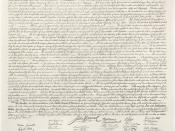'... equal in 'certain inalienable rights among which are
life, liberty, and the pursuit of happiness'
This they said, and this meant.' (Lincoln).
In June 1976 Congress appointed a committee of Five to draft a statement to the world presenting the colonies' case for independence. The committee consisted of John Adams of Massachusetts, Roger Sherman of Connecticut, Benjamin Franklin of Pennsylvania, Robert R. Livingston of New York and Thomas Jefferson of Virginia. The committee assigned Jefferson the task of writing the original document. After minor alterations were subsequently made by Franklin and Adams, the document was submitted to Congress. Jefferson later said: 'it was intended to be an expression of the American mind'. Through the two centuries that the Declaration of Independence has been in existence it has seen many different interpretations, and it probably will see many more. The document is one of the most important pieces that based this country and hence the principles we stand for today.
We have to agree that the ideals and message of the Declaration of Independence is eternal and unchangeable. Any other view makes the country a shaky leaf floating on a wavy ocean, making it possible to turn this country into a tyranical state, because of the lack of set ideas. We can see that different ideas are prevalent in interpretation of Declaration of Independence. For the purposes of this paper I have divided the different views into two main categories: First the people who hold the Declaration of Independence to be in the past with a different meaning or not clear to understand, and second the interpretations that give a universal, eternal meaning to the text. Many people in high positions that have had the responsibility to interpret the Declaration of Independence have not done it justice. They have given...


